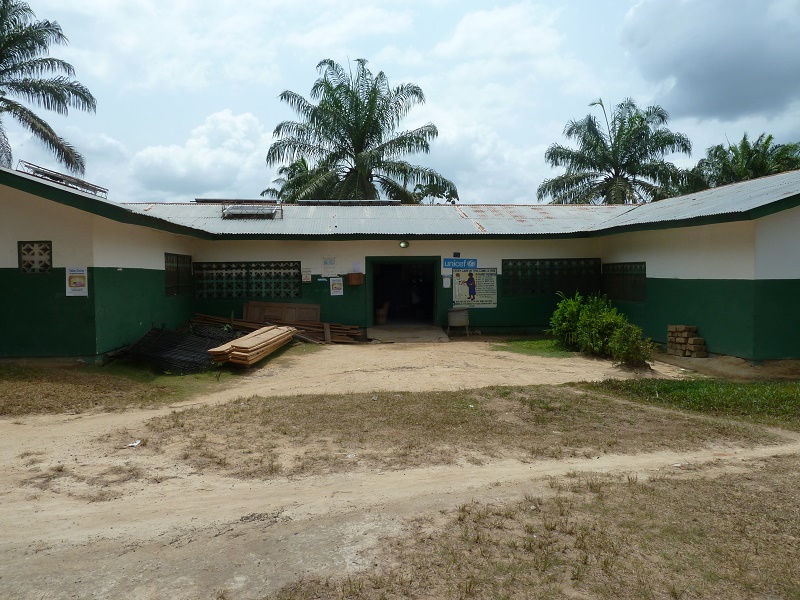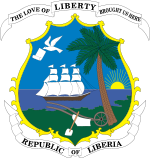On June 1st 2018 the Super Morning radio talk show reported the Gbarzon Health Center in Grand Gedeh County to be “in complete darkness“. When hearing this, Freeman K. Godu, technical coordinator at GIZ/Energizing Development (EnDev) Project, remembered that in 2013 this very health facility had received a solar system with the capacity of 750 W, installed by the Medical Emergency Relief International (MERLIN).
GIZ/EnDev operates a “solar hotline” (0888-301-778) that any health facility with solar system problems can call to get help. After hearing about the problem in Gbarzon, Freeman K. Godu, revised the usual process and contacted the health facility himself. The new Officer in Charge (OiC), Edwin J. Berry, confirmed the power loss. He did not know the location of the solar system, as no one had explained it to him when he became OiC. On the phone, Mr. Godu navigated Mr. Berry to find the solar system, and there the OiC could see and announce the number of the very solar hotline he was talking on. After a few questions and answers, Mr. Godu could trace the power loss to empty batteries, and directed the OiC to reset the system.
The next day, Mr. Godu called again to follow up. Even though the batteries were full now, the light had not come on. With some inquiry it became clear that the master switch was broken. Mr. Godu advised to get an electrician to change the switch. On the following day the OiC contacted Mr. Godu to tell him that the electrician found the switch to be broken. After replacing them with new ones the light was theoretically working again. The issue that prevented the whole facility to have light now, were some broken light bulbs. This shows the preventable notion of many issues, as light bulbs have an estimated life span of 2 - 5 years. If this is clearly communicated the responsible people can store enough spare bulbs for cases like this. Fortunately, Mr. Godu could arrange to stop at Gbarzon Health center one week later when he was working in the Southeast. He provided the needed bulbs, and checked the system. Due to the coordination between the OiC and a EnDev staff member, there was light again at the Gbarzon Health Center, only days after getting into contact.
This incidence highlights the need for an effective approach to monitor, maintain and repair solar systems at public facilities. Unfortunately, Gbarzon is not the only health facility that has unnecessarily suffered from darkness because the staff did not monitor, maintain or know about the solar system or whom to call for help. Such lack of communication to staff turnover can easily lead to problems due to lack of maintenance or misuse of equipment, as in one case where a solar system was used to charge a car battery.
While cold chain technicians visit all health facilities on a regular basis, no one from the County Health Team checks if the solar systems are monitored and well maintained. Some health facilities get fuel to run generators, but there is not yet any sustainable funding source established to replace solar system parts if they break down or reach the end of their lifespan. The Ministry of Health has not yet any system in place to ensure that solar electricity can continue without interruptions.
As a first step, GIZ/EnDev has developed an android app that can be used on any smartphone to register and monitor renewable energy systems, and to document needed repairs. If the involved stakeholders start using this app, procedures of registering, monitoring, maintaining and repairing solar systems could be integrated into routines and standard procedures. However, for now it depends on individual OiCs in health facilities or attentive solar experts such as Mr. Godu to show initiative and use the solar hotline number to solve small technical problems to lead the way out of darkness.



